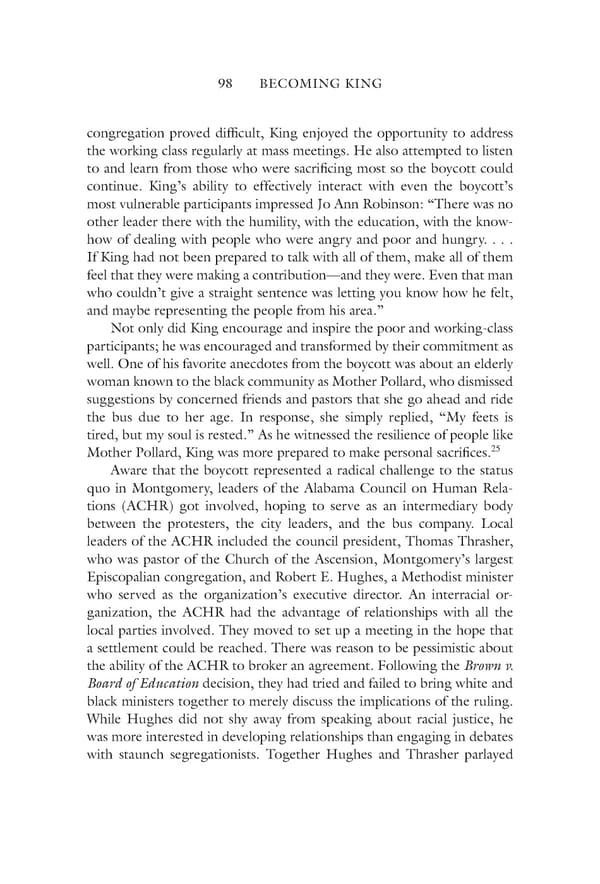98 BECOMING KING congregation proved difficult, King enjoyed the opportunity to address the working class regularly at mass meetings. He also attempted to listen to and learn from those who were sacrificing most so the boycott could continue. King’s ability to effectively interact with even the boycott’s most vulnerable participants impressed Jo Ann Robinson: “There was no other leader there with the humility, with the education, with the know- how of dealing with people who were angry and poor and hungry. . . . If King had not been prepared to talk with all of them, make all of them feel that they were making a contribution—and they were. Even that man who couldn’t give a straight sentence was letting you know how he felt, and maybe representing the people from his area.” Not only did King encourage and inspire the poor and working-class participants; he was encouraged and transformed by their commitment as well. One of his favorite anecdotes from the boycott was about an elderly woman known to the black community as Mother Pollard, who dismissed suggestions by concerned friends and pastors that she go ahead and ride the bus due to her age. In response, she simply replied, “My feets is tired, but my soul is rested.” As he witnessed the resilience of people like 25 Mother Pollard, King was more prepared to make personal sacrifices. Aware that the boycott represented a radical challenge to the status quo in Montgomery, leaders of the Alabama Council on Human Rela- tions (ACHR) got involved, hoping to serve as an intermediary body between the protesters, the city leaders, and the bus company. Local leaders of the ACHR included the council president, Thomas Thrasher, who was pastor of the Church of the Ascension, Montgomery’s largest Episcopalian congregation, and Robert E. Hughes, a Methodist minister who served as the organization’s executive director. An interracial or- ganization, the ACHR had the advantage of relationships with all the local parties involved. They moved to set up a meeting in the hope that a settlement could be reached. There was reason to be pessimistic about the ability of the ACHR to broker an agreement. Following the Brown v. Board of Education decision, they had tried and failed to bring white and black ministers together to merely discuss the implications of the ruling. While Hughes did not shy away from speaking about racial justice, he was more interested in developing relationships than engaging in debates with staunch segregationists. Together Hughes and Thrasher parlayed
 Becoming King: Martin Luther King Jr. Page 118 Page 120
Becoming King: Martin Luther King Jr. Page 118 Page 120